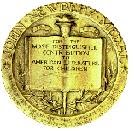Systematic Student:
award
South American Fairy Tales

Review: Carver and Sylvia — a life in verse

Review: John Lennon: All I Want is the Truth by Elizabeth Partridge

Review: The Voice that Challenged a Nation by Russell Freedman

Review: Gay-Neck, the Story of a Pigeon by Dhan Gopal Mukerji

Review: how i live now by Meg Rosoff

Review: Figgs and Phantoms by Ellen Raskin

Review: The Invention of Hugo Cabret by Brian Selznick

While I'm on the topic-

Does this mean I'm just great, or what?!

Review: American Born Chinese by Gene Luen Yang

I feel the love!

Short Stories of Isaac Bashevis Singer

Now, about those lists...

Interview with Eilis O'Neal

Interview with Jaclyn Dolamore and Giveaway!

Newbery Nonfiction — The Story of Mankind

Memory Monday: Welcome Ems! Our second Guest!

How do you feel about lists?

















